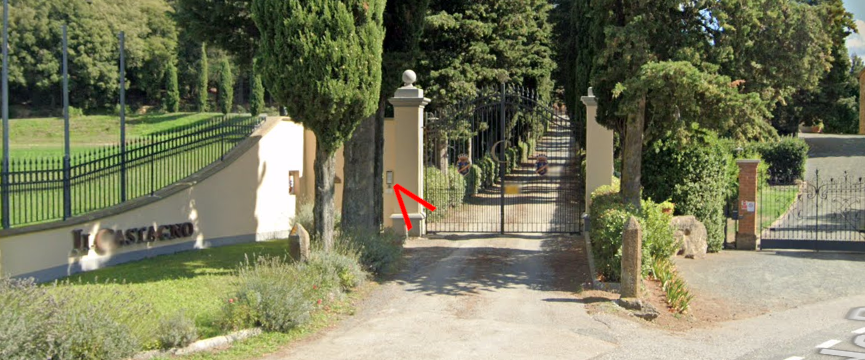

FAQs

Question
How do I get through the gate once I arrive?
Answer
Use the buzzer. See picture above. They will likely open the gate after a short wait without responding.
Question
What should I pack?
Answer
Comfortable shoes! You probably need to pack less than you think, but comfortable shoes are a priority; you will encounter a lot of gravel and cobblestone. In Italy, by law, you must carry an ID at all times, which if you are not Italian, is your passport. If you are uncomfortable doing so, at the very least, carry a copy of your passport at all times. Italy in October can be warm or cool. I would recommend bringing layers, just in case. In October, the average high is 71° F (22° C), daily average 61° (16°), and average low 52° (11°). The climate in October is quite similar to that of Annapolis, MD. Don't forget a power adapter. See below.
Question
What is the dress code for the ceremony?
Answer
We politely request cocktail attire for the ceremony and reception. We suggest smart casual attire for the other events.
Question
What power adapters do I need to bring?
Answer
Italy uses Type C / Type L / Type F power sockets. A "Europe" adapter with two prongs will work fine anywhere in Italy. For three prong adapters, it's probably best to lean toward a Type F adapter as they are starting to be more common, and are used most places in continental Europe. Italy, like all of Europe, uses 220v power supply. Any device you expect to bring to Europe should be marked as AC100-240V input. Any device that is unmarked may start on fire if you try to use it. Anything marked AC100-120V or anything with a motor/heating element such a hairdryer, will definitely start on fire, so don't bring them.
Question
Don't forget your passport!
Answer
Check your passport early, as it is required to be valid for 6 months after your departure from Europe. Due to long processing times, we recommend submitting for renewal earlier than later if needed. You must carry your passport (or an EU state ID) at all times while in public, per Italian law.
Question
How should I get cash? Will my cards work?
Answer
You can get some euro from your local bank in the US before departing, which will likely be at a good exchange rate. In Europe, do not use exchanges unless you must; their rates are very unfavorable. Use ATMs. At ATMs or at businesses, while paying with card, always pay in euro! Do not accept the offer to pay in USD, if it is offered. The conversion rate the banks use for this is always higher than any exchange fees your card may assess. Also, be aware if the card(s) you are attempting to use issue foreign exchange fees, as you may have some that do and some that don't. Visa cards are accepted most places; Mastercard occasionally, and American Express rarely. You should notify your card issuer that you will be traveling. But don't expect every place to accept cards; carry some cash just in case.
Question
I'm Hungry!
Answer
Hi hungry! PLEASE come hungry to the reception! You will not be disappointed. At other times, this is Tuscany! There is great food around every corner. We're happy to offer suggestions if you have questions. If you are onsite and do not have access to a car, there is a great restaurant right across the road from the gate to the property, Osteria del Castagno, open for breakfast, lunch, and dinner.
Question
Help! I forgot or need something! I want to buy food for the kitchen in my room!
Answer
There are a few supermarkets in the area, between 10 and 20 minutes away by car. Pam and Coop are popular brands. If you don't have a car, a trip can be arranged.
Question
I'm driving into a city. What's the deal with the ZTL? Why is it closed?
Answer
In Italy, the ZTL exists to keep historic downtowns relatively free of cars, except for people who live there. Do not go into a ZTL unless you have a hotel or parking garage already arranged, or you will be fined up to 100 euros per infraction. If you have a garage or hotel, they will submit your license plate to an exemption list for the 3 hour window that you arrived/departed.
Question
What are other important things to remember for driving in Italy?
Answer
Low beam headlights must always be on outside city centers, no matter the time of day. Beware of speed cameras, including on highways. You can use the Waze app to keep aware of them. On highways, always keep right unless passing. (This is true in the US as well! But in Italy it is enforced.) Avoid yellow Telepass lanes if you don't have a Telepass device for tolls. White lanes are for cash, blue lanes are for cards.
Question
Why are waiters ignoring me?
Answer
In Europe, life is much slower. They're not jamming a 30 minute lunch in on the way to an afternoon of business calls. Wait staff expect you to enjoy your meal and your time at a leisurely pace, and Europeans believe if wait staff talk to you often without you asking once the meal has started, it is rude and implies you're not welcome. So then, they will let you dine in peace until you need something. A quick wave should notify them you want their attention. Also, wait staff in Europe are paid livable wages, and thus you may tip up to 10% for excellent service, but usually a euro or two will be just fine.
Question
Why are there all these fees on my restaurant bill? I didn't order this...
Answer
If you are dining in a restaurant, expect small additional fees called "Coperto", as the restaurant charges a fee for table service. The restaurant has to pay additional taxes on tables as well as paying livable wage to wait staff. The restaurant doesn't add the fees for to-go/takeaway. Additionally, a service charge may be added to further pay for the wait staff. On the other hand, this is largely offset by not tipping as much as you would at home, as they are usually only a few euro. Also note that if you ask for water in a restaurant in Europe it will be from a bottle, and thus billed. It is largely considered a faux-pas to ask for free/tap water.
Question
What else do I need to know about restaurants?
Answer
Food is life; especially in Italy, it permeates the culture. Italian restaurants usually offer - and the menu is organized in - 6 courses. Aperitivo - the appetizer, or amuse-bouche Antipasti - starters, including charcuterie Primi - first course, often pasta without meat. Secondi - second course, meats and seafood Insalata - salad course Dolce - dessert Plus the after dinner drinks: Caffe - coffee! An espresso helps if you just had a big meal. Digestivo - A small amount of liqueur/digestif, usually limoncello, amaro, or grappa. It isn't necessary to choose items from all the courses, but it is important that whichever you do choose, go in order. Don't order meat before pasta. However, if one person orders a primi only and one a secondi only, it's ok to have them at the same time. Italians usually don't have big breakfasts; a common breakfast is coffee and a pastry (get the sfogliatella). Lunch is late and dinner is later, often around 8-9pm. Many restaurants close from 2 to 5 or 6 or thereabouts. It's ok if you go for dinner at 6 and few people are there, it may have just opened. Italian espresso is great. An americano (a shot of espresso in a cup of hot water) will approximate drip coffee, though there are drip coffeemakers in the rooms. A true cappuccino is excellent, but please only order them before noon.
Question
What do I need to know when traveling through Europe?
Answer
Enjoy the journey. Everything in Italy, and most of Europe, moves more slowly, and no one is really in a hurry. If you are in a hurry, ask yourself why. Slowing down and moving at the pace of everyone else will make everything easier. Expect things to take time. Take the long walk. Once you get used to it, it's hard to go back. Bathrooms are not always available in stores and restaurants, do not expect the next place you go will have one. Make use of available bathrooms while you are able. Always carry at least one euro coin with you at all times, as many bathrooms require you to pay, and you don't want to be caught without a coin. When visiting religious attractions such as cathedrals, covered shoulders and knees are expected. Some will lend you a thin wrap for a fee, but not all. Book tickets online to museums and attractions ahead of time if possible, as there are often long lines for the ticket booths. Just like large cities anywhere, beware of scams and pickpockets. Don't carry too much cash or valuables in public, and be aware of where they are. Don't let strangers give you anything, as they will make you pay. If someone seems eager to do something for you for free, or if someone is too eager to talk to you, it's probably not actually free. If someone you don't know is too eager to bring you somewhere, beware. Europeans don't approach each other on the sidewalks with big smiles getting your attention, if they did they'd be called crazy. If a restaurant is too eager to hand you a menu on the sidewalk, the food may not be very good.
Question
How do I get in touch with you or ask questions?
Answer
Please reach us at azoulaya@gmail.com and nickbroten01@gmail.com .